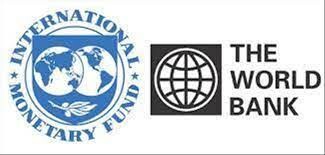The US Department of State and the international financial institutions are urging the government of South Sudan to maintain the Public Financial Management (PFM) reforms it embarked on with the help of the International Monetary Fund (IMF) through its Rapid Credit Facility (RCF).
South Sudan’s Minister of Finance and Planning Agak Achuil Lual last week led a government delegation that participated in the World Bank–International Monetary Fund (IMF) Spring Meetings in Washington DC, USA.
He was accompanied by the Bank of South Sudan Governor Moses Makur Deng and other government officials.
The meeting focused on the World Economic outlook in the wake of the war in Ukraine, global financial stability, fiscal monitoring, and policy advice.
Minister Achuil said they discussed the impact of the global shock on the Republic of South Sudan which includes the ongoing pandemic, climate change challenges (floods), and the war in Ukraine while in Washington DC.
“We explained to the World Bank and IMF that South Sudan continues to face indirect effects of the war in Ukraine, which induced higher food and fuel prices and steeper transport costs given our poor road connectivity. These global challenges remain a massive shock to us in South Sudan,” Achuil told reporters in Juba on Thursday.
“In line with the above challenges, we intend to request for a long-term arrangement under Extended Credit Facility (ECF) with the IMF,” he added.
The Finance Minister lauded the World Bank and IMF for their strong partnership and increased support to South Sudan especially during the Covid-19 Pandemic most importantly in their ongoing support in the areas of health, women and youth empowerment, agriculture, Livestock and Fisheries, and the Public Financial Management (PFM) reform.
“We have positive discussions in the areas of the ongoing Public Financial Management (PFM) reforms which includes successful implementation of the Rapid Credit Facility (RCF 1), harmonization of the exchange rate and payment of salary arrears, and also RCF 2,” Minister Agak noted. “We also held discussions with the US State Department where they acknowledge the positive economic reforms and encouraged the government to continue to improve transparency and accountability.”
Agak said the most important part of all those engagements was that they must implement and maintain peace because peace is the key to all the reforms.
Meanwhile, Moses Makur Deng, the Governor of the Central Bank of South Sudan said the IMF and the World Bank which have been supporting them were impressed by the reforms that the government of South Sudan has achieved.
“We were praised for the first time that you have done something good, only we need you to sustain what you have achieved and we told them that we cannot guarantee sustainability unless we are supported to do that,” Makur said.
Makur said they told the World Bank and the IMF that reforms are not a unanimous agenda for all the South Sudanese adding that a small group is working against the reforms for fear of upsetting the status quo.




